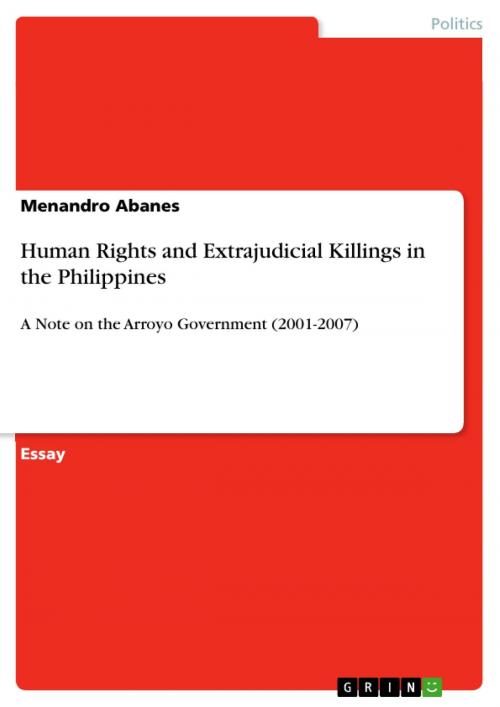Human Rights and Extrajudicial Killings in the Philippines
A Note on the Arroyo Government (2001-2007)
| Author: | Menandro Abanes | ISBN: | 9783640933259 |
| Publisher: | GRIN Verlag | Publication: | June 7, 2011 |
| Imprint: | GRIN Verlag | Language: | English |
| Author: | Menandro Abanes |
| ISBN: | 9783640933259 |
| Publisher: | GRIN Verlag |
| Publication: | June 7, 2011 |
| Imprint: | GRIN Verlag |
| Language: | English |
Essay from the year 2008 in the subject Politics - International Politics - Topic: Public International Law and Human Rights, University for Peace, course: International Peace Studies, language: English, abstract: There were hundreds of documented reports of extrajudicial killings, a blatant human rights violation, in the Philippines from 2001 to 2007. The Philippines is one of the first signatories to the UN Declaration on Human Rights. Signatories of the declaration recognize that these standards impose obligations, duties and commitments on them to comply and enforce in their respective territorial state. The the practice of human rights heavily relies on the political, economic, and cultural dynamics of a certain state. This monism follows the generally accepted principle that the enforcement of human rights is in the hands of the states. Thus, can being a signatory to the declaration make a difference in the protection and respect of human rights? This paper looks at the case of the Philippine government under the Arroyo administration, as a signatory to the declaration, and how it performs in the field of human rights particularly with regard to the spate of extrajudicial killings by revisiting the reports of Melo commission and UN-designated Special Rapporteur, Philip Alston, on extrajudicial, summary or arbitrary executions. Then, the paper proceeds with a discussion on the effect of ratifying an internationally-accepted declaration on the Philippine government in the hope of an end to the killings.
Menandro S. Abanes is a researcher from the Philippines. He earned his PhD in Social Science from Radboud University Nijmegen. He teaches at Ateneo de Naga University in Bicol, Philippines.
Essay from the year 2008 in the subject Politics - International Politics - Topic: Public International Law and Human Rights, University for Peace, course: International Peace Studies, language: English, abstract: There were hundreds of documented reports of extrajudicial killings, a blatant human rights violation, in the Philippines from 2001 to 2007. The Philippines is one of the first signatories to the UN Declaration on Human Rights. Signatories of the declaration recognize that these standards impose obligations, duties and commitments on them to comply and enforce in their respective territorial state. The the practice of human rights heavily relies on the political, economic, and cultural dynamics of a certain state. This monism follows the generally accepted principle that the enforcement of human rights is in the hands of the states. Thus, can being a signatory to the declaration make a difference in the protection and respect of human rights? This paper looks at the case of the Philippine government under the Arroyo administration, as a signatory to the declaration, and how it performs in the field of human rights particularly with regard to the spate of extrajudicial killings by revisiting the reports of Melo commission and UN-designated Special Rapporteur, Philip Alston, on extrajudicial, summary or arbitrary executions. Then, the paper proceeds with a discussion on the effect of ratifying an internationally-accepted declaration on the Philippine government in the hope of an end to the killings.
Menandro S. Abanes is a researcher from the Philippines. He earned his PhD in Social Science from Radboud University Nijmegen. He teaches at Ateneo de Naga University in Bicol, Philippines.















